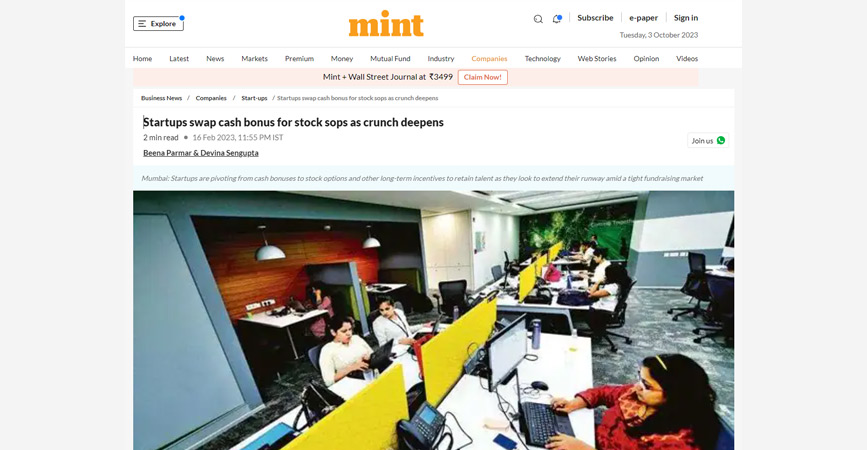
Mumbai: Startups are pivoting from cash bonuses to stock options and other long-term incentives to retain talent as they look to extend their runway amid a tight fundraising market.
The balance sheets of many edtech, software and fintech startups remain strained even after multiple rounds of layoffs to save costs. While some startups are shifting to restricted stock units (RSUs), others are increasing targets and asking their leaders to forgo incentives. “One consumer media internet firm we work with, which witnessed some layoffs, has also made their sales incentives tougher and less achievable. Two SaaS unicorns we are working closely with, while they had been circumspect in hiring, one of them has not paid any bonuses to leadership team but have retained some bonus for other employees,” said Harold D’Souza, co-founder and director at search firm WalkWater Talent Advisors.
For instance, SoftBank-backed edtech unicorn Unacademy said it would not offer cash appraisals to employees this year and instead roll out stock options based on individual performance.
The startup sector has laid off more than 20,000 workers since last year and is expected to continue with retrenchments as the funding winter continues. Consulting firm Aon said the impact of these changes might deter young workers further from the startup sector. “Cash bonuses are an annual component whereas ESOPs and other stock-based LTIs (long-term incentives) vest over 3-4 years, targeting retention, long-term performance and wealth creation. However, given the volatility in markets and lesser upside opportunities in the medium term, younger talent may not find ESOPs attractive,” said Roopank Chaudhary, a partner at Human Capital Solutions, Aon India. Chaudhary has also noticed that restricted stock units are being granted. A Bengaluru-based software startup is changing its salary structure by including incentives within the total compensation package.“We are now remodelling compensation and packages to hedge the immediate cash outlay. To focus on growth, we are making salary structures more unified by embedding the rewards in the compensation than outside of it and making it consistent across roles,” said a senior executive at the startup who did not want to be named.
Those who are keeping their structures the same are rolling out meagre incentives, a drastic departure from even a year ago when companies wooed talent, sometimes even doubling salaries. “At Whatfix, our focus is on being more sustainable and efficient by bringing in more accountability and productivity, starting with our leaders to the last employee. The plan is to achieve it by setting clear directions and defining measurable outcomes for everyone,” said Romita Mukherjee, global head of HR at Whatfix, an enterprise software platform.
Source: Mint








